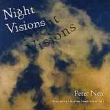A blue-ribbon panel of distinguished researchers concludes that Guitaritis causes distinct patterns of behavior in affected patients during its lifelong cycle. This disease seems to follow specific stages with fairly predictable associated symptoms and activities as described below.
A patient in this stage can often be found for countless hours behind closed doors of a "music room". Family members or roommates are systematically brainwashed by redundant phrases - played by the patient, then played from a tape/record/CD, then by the patient, then from a tape/record/CD, then by the patient, etc. This stage is chronic and there is no cure. The best that concerned family members and friends can hope for during this time is to wear earplugs and make periodic interruptions with food (pizza preferred - [easier to slip under the door]) and liquids (non-alcoholic preferred [straw through the keyhole works]).
This stage often overlaps with the Discovery stage but the patient becomes increasingly glassy-eyed and unpredictable. This stage should be carefully monitored. Symptoms may include:
This is an important stage of the affliction. Often times the patient, having written some songs, plans to "make it big" and retire at an early age. Hastiness with arranging recording time, CD release(s), marketing, distribution and too much time perusing real estate in Laurel Canyon often lead to the onset of Stage 4 with alarming rapidity. With careful guidance, however, the effects of the 4th stage can be minimized or avoided completely.
Intervention by professionals is often required during this stage. The Crash can occur at any age but usually comes between the ages of 28 and 39. Patients are often disillusioned, melancholic and depressed when they face up to the realization that they didn't retire by age 26. Their poorly planned CD(s) and release(s), although chock full of great licks and even a few great tunes, didn't bring them their life of fame and fortune. Sadly, there is no Mercedes in the driveway, little money in the bank, and the acreage is still available - and out of reach - in Laurel Canyon.
This stage can take many forms - patients who went through Stage 3 without having their feet firmly on the ground often have the most difficulty at this point. Reports of wild-eyed middle aged chimney sweeps, maintenance men, street beggars and part-time construction workers bemoaning "today's music" and boring coworkers and acquaintances with their former guitar glory days are, sadly, quite true.
Conversely, patients who went directly from Stage 3 to Stage 5, or who went through Stage 4 with minimum duress are considered successful recovering patients and often take up activities ranging from working in recording studios, to giving guitar lessons, to working in music stores, to getting a job in the "real" world. These individuals perform their duties with a quiet acceptance of their fate. The guitar, no longer the entire center of the patient's world, is still played, but is now balanced with other meaningful life experiences and undertakings.
Patients who reach Stage 5 as described immediately above, realize that there will always be more accomplished guitarists out there, but no longer feel a need to compete with them. Instead, these patients who have their Guitaritis in complete remission have obtained the wisdom that every player embodies his or her own unique approach and talents to the instrument - and their own particular gift holds an honorable and distinct place in the universe - worthy of a standing ovation.
Peter Neri began playing the electric guitar as a teenager. While playing lead guitar with Connecticut rock groups in the 1970s, his bands opened for such legendary acts as The Lovin' Spoonful, Paul Revere and the Raiders, The Dave Clark Five and Iron Butterfly.
Moving on with his life and musical interests, Peter put down the electric guitar for good in the 1980s. He moved to Vermont and began studying the classical guitar. While performing traditional classical guitar pieces, he also began writing music for the acoustic guitar.
The release of "Night Visions" was Peter's first solo acoustic guitar CD. Many selections from this eclectic album have been aired on National Public Radio.
